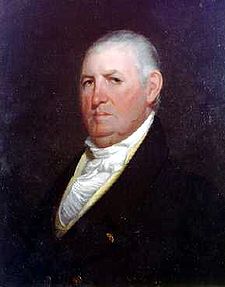 Isaac Shelby
Isaac Shelby
Isaac Shelby (December 11, 1750 – July 18, 1826) was the first and fifth Governor of Kentucky and served in the state legislatures of Virginia and North Carolina. He was also a soldier in Lord Dunmore's War, the Revolutionary War, and the War of 1812. While governor, he personally led the Kentucky militia in the Battle of the Thames, an action that was rewarded with a Congressional Gold Medal. Counties in nine states, and several cities and military bases, have been named in his honor. His fondness for John Dickinson's The Liberty Song is believed to be the reason Kentucky adopted the state motto "United we stand, divided we fall".
Isaac Shelby was born in the Province of Maryland on December 11, 1750, near Hagerstown in Frederick (now Washington) County. He was the third child and second son of Evan and Letitia (Cox) Shelby, who immigrated from Tregaron, Wales, in 1735. After his education at local schools, Shelby worked on his father'splantation, and occasionally found work as a surveyor. Shelby's father lost a great deal of money when Pontiac's Rebellion disrupted his lucrative fur trade business, and two years later, the business' records were destroyed in a house fire. Consequently in December 1770, the family moved to the area near Bristol, Tennessee, where they built a fort and a trading post. Here, Shelby and his father worked for three years herding cattle.
Shelby's military service began when he served as second-in-command to his father at the Battle of Point Pleasant, the only major battle of Lord Dunmore's War. He gained the reputation of an expert woodsman and surveyor, and spent the early part of the Revolutionary War gathering supplies for the Continental Army. Later in the war, he and John Sevier led expeditions over the Appalachian Mountains against the British forces in North Carolina. He played a pivotal role in the British defeat at the Battle of King's Mountain. For his service, he was presented with a ceremonial sword and a pair of pistols by the North Carolina legislature, and the nickname "Old King's Mountain" followed him the rest of his life.
Following the war, Shelby relocated to Kentucky on lands awarded to him for his military service and became involved in Kentucky's transition from a countyof Virginia to an independent state. His heroism made him popular with the citizens of the state, and the state electoral college unanimously elected him governor in 1792. He secured the state from Indian attacks and organized its first government. He leveraged the Citizen Genet affair to convince the Washington administration to make an agreement with the Spanish for free trade on the Mississippi River.
At the end of his gubernatorial term, Shelby retired from public life, but he was called back into politics by the impending War of 1812. Kentuckians urgedShelby to run for governor again and lead them through the anticipated conflict. He was elected easily, and at the request of General William Henry Harrison, commanded troops from Kentucky at the Battle of the Thames. At the conclusion of the war, he declined President James Monroe's offer to become Secretary of War. In his last act of public service, he and Andrew Jackson acted as commissioners to negotiate the Jackson Purchase from the Chickasaw Indian tribe. Already a founding member of the Kentucky Bible Society, Shelby consented to serve as vice-president of the New American Bible Society in 1816. He was a faithful member of Danville Presbyterian church, but in 1816, built a small nondenominational church on his property. He also served as the first president of the Kentucky Agricultural Society in 1818, and was chairman of the first Board of Trustees of Centre College in 1819. Shelby died at his estate in Lincoln County, Kentucky, on July 18, 1826.

